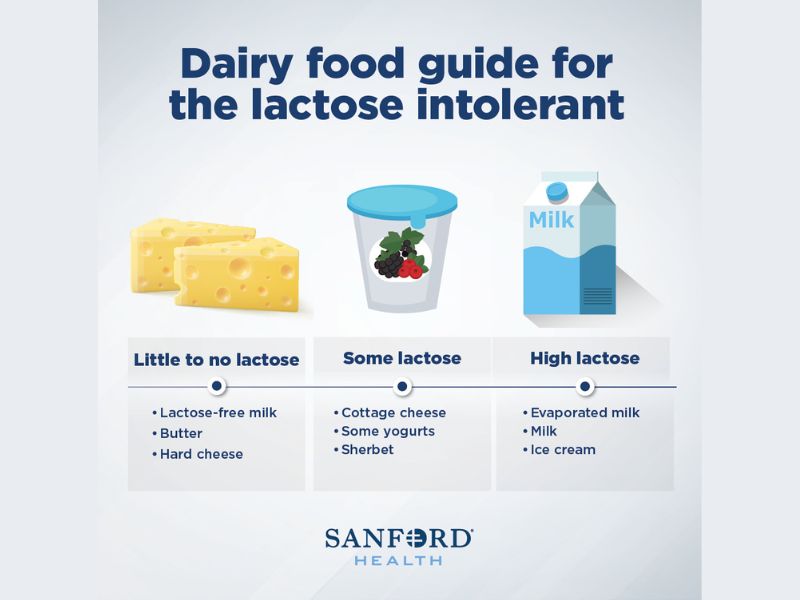Ice cream is the perfect antidote to summer heat. Whether you pull it out of your own freezer or order from a shop, frosty flavor fills your mouth until it’s gone — usually far too soon.
Unfortunately, though, if you have lactose intolerance, that delicious reprieve could end up tormenting your tummy within a couple of hours.
If you have lactose intolerance, you’re certainly not alone. And you can find ways to help avoid the unpleasant symptoms, assures Dr. Nicole Cox, an internal medicine specialist for Sanford Health.
What is lactose intolerance? Who gets it?
Lactose intolerance can show up as a variety of symptoms, including diarrhea, stomach pain, abdominal distension or gas, Dr. Cox said.
It’s a relatively common cause of bowel issues. “I think it crosses our patients’ minds a lot when they’re having issues that that might be a possibility,” Dr. Cox said. “So we do get a lot of questions asked about it.”
Lactose intolerance is caused by a deficiency of the enzyme lactase. That enzyme normally breaks down the lactose sugar present in dairy products, or in foods containing dairy products.
Lactose intolerance differs from a milk allergy, where the body reacts to the protein in milk.
While a rare, severe, infant version of lactose intolerance is caused by mutations on a certain gene, the more common adult version happens gradually as that same gene decreases its activity over time after infancy, according to the National Institutes of Health.
Not all people are affected equally, though.
Dr. Cox said the condition is less common in people with European ancestry and more prevalent in people with African, Asian and Latin ancestry, as well as Native Americans. Symptoms can appear in childhood or show up as people age.
Lactose intolerance can vary in sensitivity as well. Some people can handle consuming certain kinds of dairy, or certain amounts of lactose, or less frequent consumption before symptoms arise. Others can be far more sensitive to small amounts.
How do you know if you have lactose intolerance?
If they suspect lactose intolerance, Dr. Cox said, “most people initially start by trying to avoid lactose-containing foods.”
With this kind of elimination diet, if symptoms cease showing up after meals, that can indicate a lactose intolerance.
Talk with your health care provider about your concerns. There also are a couple of tests for lactose intolerance, one using breath tests and one using blood tests, both kinds administered after a person drinks liquid containing lactose.
An elimination diet can be a good step if a person has no concerning symptoms such as blood in the stool, excessive diarrhea, nausea or vomiting.
“I have a lot of patients food journal, as far as what did they eat the day before, or what did they eat a few hours before symptoms started?” Dr. Cox said. “That can start us in the right direction as far as trying to figure out if there is something dietary that’s precipitating their symptoms.”
How can you treat it?
One way to prevent symptoms of lactose intolerance is to eliminate dairy products from your diet. This doesn’t necessarily mean all dairy products, however. Some are higher in lactose than others, and people with lower sensitivities can probably tolerate some products. Just keep track of which products result in symptoms.
Milk and certain items containing milk, such as ice cream, have much more lactose than products such as sherbet, butter or hard cheeses. Evaporated and sweetened condensed milk have a very high amount of lactose, Dr. Cox added.
Fortunately, a lot of dairy substitutes have become available offering alternative milks, ice creams, cheeses and much more. So you don’t have to completely give up the flavors you love.
Just be sure you’re still consuming foods containing calcium and vitamin D, important for bone health, if you have to eliminate almost all dairy. Or add supplements.
Another way to avoid symptoms, Dr. Cox said, is to try an over-the-counter enzyme product (such as Lactaid or Dairy Ease) to supplement your body’s lactase enzyme. Taken around the time you start eating a meal at a restaurant, for example, you then can consume dairy products.
“Those can be pretty effective for people, depending on how significant their distress is when they consume lactose,” Dr. Cox said.
They can be helpful, too, when you’re not sure of the ingredients in a dish. For example, you may order pasta and not realize that evaporated milk makes up a significant part of the sauce.
“Some of those more subtle things that sneak into our meals can also cause problems for people,” Dr. Cox said.
Some breads, cereals, salad dressings, soups, frostings and even deli meats may contain lactose, too.
Learn more
- How to combat vitamin D deficiency
- How to manage your child’s food allergies
- Crohn’s, ulcerative colitis patients reclaim lives with help
…
Posted In Detroit Lakes, Digestive Health, Internal Medicine, Nutrition
